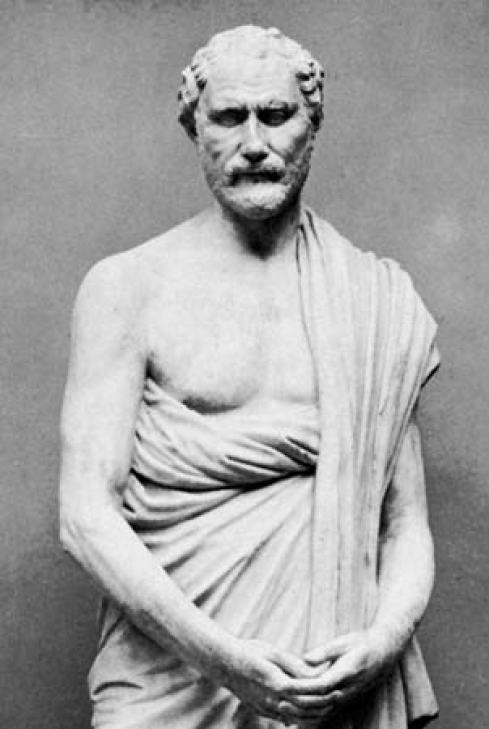Aelius Aristides, Panathenaic Oration, 282-285
“But [the Spartans] dealt with those who entrusted their safety to them so that they defended themselves best of all people against those charges which at certain times were brought against our city. The explanation for this is not their savagery nor any of those common things which one might easily say to fault them, but the basic failure of their nature to measure up to ours. While the Athenians, furthermore, were in control for more than 70 years, the Spartans could not even hold their empire for three Olympiads. And this would not have even been a true statement if they had not taken over while the first Olympiad period ongoing!
This is why I get annoyed at those who want to compare the two cities. I might in fact seem strange to some of you in criticizing them and then proceeding to do the same thing myself all while saying these things for the very same reasons that I claim they shouldn’t be said. But this illustrates clearly that whatever favor they believe they bestow on the city is not at all remarkable and that these sorts of arguments are not be made freely. So, if someone thinks that I should not have said these things, this is why I said them. In addition, these statements were made without personal attack and because of a pressing need—for there was no other way to show what I wanted to and I was compelled to say what I said for the very reasons I tried not to.
For the Spartans seem to me to have suffered in comparison to this city what Teucer did from Ajax at Homer’s hands. For Teucer retreats to Ajax when he risks his life in front of the rest and at the same time is famous and then sullied by this. In the same way, the Spartans, who stood in front and endangered themselves for the Greeks in a time of need, are still children when compared to our city.”
οἱ δ’ οὕτω τοὺς παραδόντας αὑτοὺς διέθηκαν ὥστε κάλλιστ’ ἀνθρώπων ἀπελογήσαντο ὑπὲρ τῶν κατὰ καιρούς τινας αἰτιῶν γενομένων παρ’ ἐνίων τῇ πόλει. αἴτιον δ’ οὐκ ὠμότης οὐδ’ ἅ τις ἂν φαίη τῶν ῥᾳδίως εἰωθότων ἐπιτιμᾶν, ἀλλὰ τὸ μὴ ἐξικνεῖσθαι τὰς φύσεις ἄχρι τοῦ ἴσου. καὶ μὴν οἱ μὲν πλέον ἢ ἑβδομήκοντα ἔτη κατέσχον, οἱ δ’ οὐδ’ εἰς τρεῖς Ὀλυμπιάδας διεφύλαξαν τὴν ἀρχήν. οὔκουν ὡς ἀληθῶς ἄλλως γε ἂν εἴη, εἰ μὴ τὸ πρῶτον Ὀλυμπίων προσαγόντων παρέλαβον.
ταῦτ’ ἐστὶν ἁγὼ τοῖς παρεξετάζειν βουλομένοις ἄχθομαι. ἴσως μὲν οὖν κἀγώ τισι ποιεῖν ἄτοπον δοκῶ, μεμφόμενος μὲν, αὐτὸς δ’ εἰς τοὺς ὁμοίους λόγους προεληλυθώς, καὶ δι’ αὐτά γε ταῦτ’ εἰρηκὼς αὐτοὺς δι’ ἅ φημι δεῖν μὴ λέγειν. οὐ μὴν ἀλλ’ ἐξ αὐτῶν τούτων καὶ μάλιστ’ ἄν τις κατίδοι ὡς οὔτε ἡ χάρις θαυμαστή, ἣν οἴονται τῇ πόλει κατατίθεσθαι, οὔτ’ ἐξεπίτηδες τά γε τοιαῦτα ἀγωνιστέον. ὥστ’ εἴ τις ἀξιοῖ καὶ ἡμῖν ἄρρητα ταῦτ’ εἶναι, σχεδὸν τούτου χάριν εἴρηται. χωρὶς δὲ τούτων ἄνευ βλασφημίας οἱ λόγοι γεγόνασι καὶ τῆς παραπεσούσης χρείας ἕνεκα. οὐ γὰρ ἦν ἄλλως ὃ προειλόμην ἀποδεῖξαι, ὥστ’ ἐξ ὧν ἔφευγον, ἐκ τούτων προήχθην εἰπεῖν.
δοκοῦσι γάρ μοι Λακεδαιμόνιοι τὸ τοῦ παρ’ Ὁμήρῳ Τεύκρου πρὸς τὸν Αἴαντα πεπονθέναι πρὸς τὴν πόλιν. καὶ γὰρ ἐκεῖνος τῶν ἄλλων προκινδυνεύων ὡς τὸν Αἴαντα ἀναχωρεῖ καὶ δι’ ἐκείνου φαίνεται, ὡς δ’ αὕτως καὶ κρύπτεται, καὶ Λακεδαιμόνιοι οἱ τῶν Ἑλλήνων προέχοντες καὶ προκινδυνεύοντες ἐν ταῖς χρείαις παῖδες τῇ πόλει παραβαλεῖν εἰσίν.








![20180823_055445[1]](https://i0.wp.com/sententiaeantiquae.com/wp-content/uploads/2018/08/20180823_0554451.jpg?resize=656%2C492&ssl=1)
![20180823_060114[1]](https://i0.wp.com/sententiaeantiquae.com/wp-content/uploads/2018/08/20180823_0601141.jpg?resize=656%2C875&ssl=1)
![20180823_060135[1]](https://i0.wp.com/sententiaeantiquae.com/wp-content/uploads/2018/08/20180823_0601351.jpg?resize=656%2C492&ssl=1)
![20180823_061017[1]](https://i0.wp.com/sententiaeantiquae.com/wp-content/uploads/2018/08/20180823_0610171.jpg?resize=656%2C492&ssl=1)
![20180823_061209[1]](https://i0.wp.com/sententiaeantiquae.com/wp-content/uploads/2018/08/20180823_0612091.jpg?resize=656%2C492&ssl=1)
![20180823_061442[1]](https://i0.wp.com/sententiaeantiquae.com/wp-content/uploads/2018/08/20180823_06144211.jpg?resize=656%2C875&ssl=1)
![20180823_061603[1]](https://i0.wp.com/sententiaeantiquae.com/wp-content/uploads/2018/08/20180823_0616031.jpg?resize=656%2C492&ssl=1)
![20180823_062906[1]](https://i0.wp.com/sententiaeantiquae.com/wp-content/uploads/2018/08/20180823_0629061.jpg?resize=656%2C875&ssl=1)
![20180823_063433[1]](https://i0.wp.com/sententiaeantiquae.com/wp-content/uploads/2018/08/20180823_0634331.jpg?resize=656%2C492&ssl=1)
![20180823_064310[1]](https://i0.wp.com/sententiaeantiquae.com/wp-content/uploads/2018/08/20180823_0643101.jpg?resize=656%2C492&ssl=1)
![20180823_072030[1]](https://i0.wp.com/sententiaeantiquae.com/wp-content/uploads/2018/08/20180823_0720301.jpg?resize=656%2C492&ssl=1)
